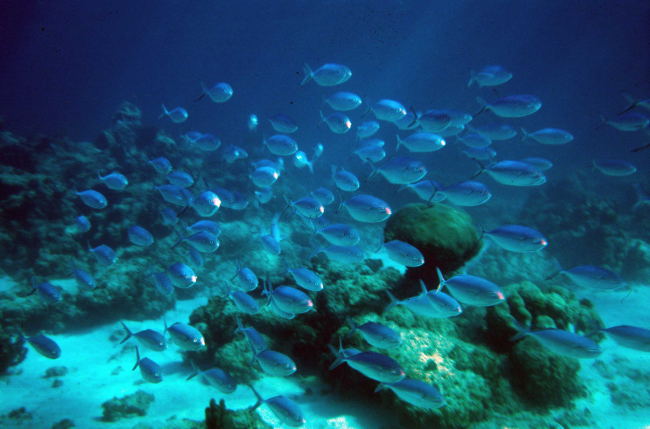21/06/2023 | There were cheers and tears of joy. When representatives of the United Nations agreed on the BBNJ (Biodiversity Beyond National Jurisdiction) treaty, UN Secretary-General Antonio Guterres spoke of "an historic achievement". The agreement had been preceded by years of tough negotiations. In March, there was finally a breakthrough and now the pact has been adopted in the UN General Assembly. Prof. Dr Raimund Bleischwitz, Scientific Director of ZMT, says the treaty is "a milestone in global marine policy and essential for the conservation of biodiversity in the oceans." In this interview, the sustainability researcher explains the important points of the agreement, which steps must now follow and how ZMT contributes to the agreement.

Prof. Dr. Raimund Bleischwitz
In a nutshell - what does the agreement contain?
Raimund Bleischwitz: Until now, only 1.2% of the two-thirds of the oceans that lie as 'high seas' outside the the territorial sea, or the internal waters of a country had been protected – slightly more if coastal waters and the Exclusive Economic Zones (EEZs, 200-mile zone) of coastal countries are included. Now 30% is to be designated as marine protected zones by 2030. This is considerable. A healthy ocean is central to the survival of countless species and humans. Because the ocean, as our planet's 'blue lung', produces oxygen and stores about one third of carbon greenhouse gases. The oceans are our ally in the fight against the climate crisis and against the destruction of nature.
What points are particularly noteworthy from the perspective of marine research at ZMT?
Bleischwitz:
The BBNJ agreement clarifies the fair distribution of benefits in favour of coastal communities and countries of the Global South. This means that there are regulations against possible biopiracy for genetic resources and digital sequencing and in favour of the oceans as a common heritage of humankind.
Three points are particularly important.
Firstly, the BBNJ regulates the process of designating Marine Protected Areas (MPAs) and Marine Spatial Planning (MSP) and will provide management tools to implement the 23 objectives of the Kunming-Montreal Agreement of December 2022. Thus, these agreements intertwine and do not stand in isolation. Secondly, the BBNJ regulates environmental impact assessments for (new) ocean uses (e.g. mining) and – for the first time – a legal framework for assessing the risks arising from pollution, acidification and warming of the oceans. This spurs all work on the ocean-climate nexus.
And thirdly?
Bleischwitz: The treaty will be embedded in an institutional framework, which means that it will be supported by the Conference of the Parties (CoP), the UN Secretariat and that it will also receive technical support – - similar to the climate agreement - with requirements for technology transfer and capacity building or development.
What should the next steps be now?
Bleischwitz: What is needed now is, on the one hand, a speedy signing and ratification, which the Federal Government has promised for Germany according to Federal Environment Minister Steffi Lemke. On the other hand, the suitable learning platforms must be established so that all actors from industry, coastal communities and in countries of the Global South can also implement the goals. I consider the latter to be extremely important, because knowledge generated in research must be put into practice which in turn should give impulses back.
How can the ZMT contribute to this?
Bleischwitz: At ZMT, our researchers are working a wide range of topics that play a role in the implementation of the BBNJ. I will mention just a few examples: We provide analysis on sustainable fisheries, aquaculture, tourism and the role of MPAs. Our scientists have decades of in-depth expertise on the essential role of coastal ecosystems and study solutions such as mangrove reforestation and coral reef restoration. At ZMT, we look at the interaction of ocean and climate, for example by modelling weather extremes. We investigate the consequences of nutrient input or plastics pollution in coastal waters and sediments. But we are also involved in topics such as governance, blue economy, socio-ecological processes and data science. AND: We are strongly committed to capacity development, offer a variety of trainings and have strong partnerships in Germany and especially in countries in the tropics.
It took 15 years for the UN General Assembly to agree on the BBNJ Agreement. What was the reason?
Bleischwitz: The fundamental question was whether it would be about 'freedom of the seas' – the position of the USA, Great Britain, Russia - or a 'common heritage of mankind'. Furthermore, no agreement could be reached on whether and how the fishing industry should be included; Iceland and Russia, among others, had spoken out against such an inclusion.
It was not until early 2022 that a 'Coalition of the Ambitious' consisting of a total of 50 countries, including Germany and the European Union, was formed in Brest (France), to get the agreement across the finish line. The USA joined in early 2023, which was the decisive kick. But it is also worth mentioning the ultimately constructive role played by China, which had already taken a pioneering role with the 'Kunming/Montreal targets' of a 30% designation of nature conservation areas by 2030, and had also spoken out in favour of the recognition of research results and the Common Heritage of Mankind principle with groups such as G77. There was also a group of Latin American countries (CLAM) that were very constructive and engaged.
Against the background of such difficult negotiations, what could now become problematic in the implementation of the BBNJ agreement?
Bleischwitz: I tend to look positively into the future. I am first of all pleased that the oceans have received such broad support at an international level,which is also a great success in view of the UN Ocean Decade and the Sustainable Development Goals. Of course, one should not be naive. We are currently in a difficult geopolitical situation that will not always make cooperation easy. The issue of monitoring, i.e. who makes sure that marine protected areas are respected, what are the penalties if fishing in such zones is contrary to the law, etc., still need to be regulated. Satellite data or data evaluation via drones will certainly be helpful here; ultimately, data analyses and the development of networks and partnerships such as those we operate at ZMT.





